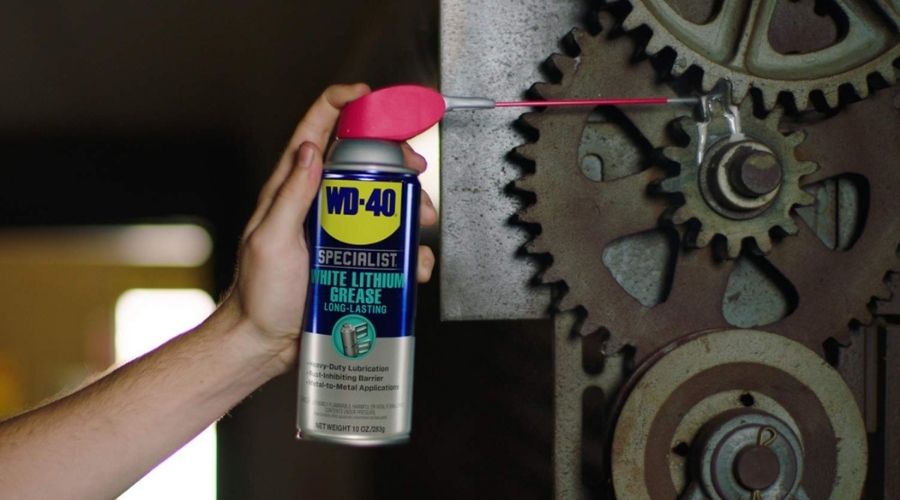
A squeaky garage door in cold weather can be a double irritation. Even worse, the squealing sound you hear each time the garage door moves is metal rubbing against metal. Such a thing could never augur well for your garage door’s lifespan.
Garage doors are made of various moving parts that need to work smoothly to last longer. When they start squeaking, they work more slowly and wear out faster.
Thankfully, the best garage door lubricant for cold weather can help your garage door operate faster and last longer.
Also Read:
Best garage door lubricant for Cold weather Reviews 2022
1.WD-40 Specialist Lubricant with Smart Straw (300012)
Are you in search of a lubricant that perfectly demonstrates versatility in terms of the surfaces it is applicable to? This is the deal for you. This practical lubricant from the high-rating WD-40 brand guarantees you unmatched appositeness to multiple surfaces like vinyl, rubber, plastic, and metal.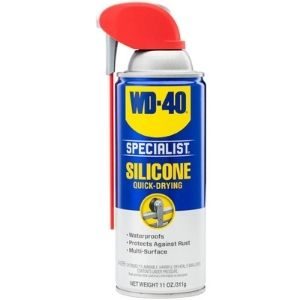
Making the bargain even better is the fact that even when applied on these different surfaces, no smudgy messes are left on the surface. On the upside, you are not only limited to using it in your garage solely as you can adapt it in other sections in your home, shop, or job site or on structures like valves, windows, pulleys, and sliding doors, among others.
You will be impressed by these lubricant fast-drying mechanism that forms a stain-resistant, clear and hard film that offers protection from non-friendly elements on your surface.
Pros
- It forms a defensive, low-friction, and waterproof film.
- Brags of a smooth exterior finish of the casing.
- Applicable on multiple surfaces.
- Safeguards surface against rust.
- Suitable for both non-metal and metal surfaces.
- The coating formed doesn’t attract dirt components.
- Tolerates a wide temperature range (-1000 to 5000 F).
- Bears a smart straw that sprays two ways.
Cons
- Wears off after some time which is expected.
Buy on Amazon
2. 3-IN-ONE Professional Garage Door Lubricant (100581)
The esteemed 3-IN-ONE brand has manufactured a lubricant that is really the bee’s knees. This product helps you reduce friction and abates corrosion and rust on the surfaces it is applied to.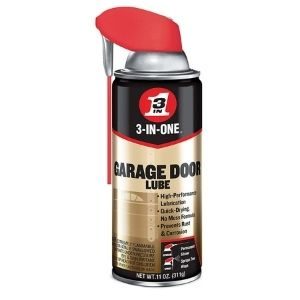
It is quite convenient as it is delivered in a ready-to-use status, therefore, demanding no assembly. The fast-drying formula is a trait featured by this tool for fast efficacy. You will undoubtedly appreciate the optimal performance in lubrication in this product.
It prides itself on practicability, ensuring that no residues remain on the surface courtesy of the fast-drying formula that assists in averting dirt from adhering. This tool’s handiness is excellent as it is engineered with convenient a spraying smart straw that is adjustable. You can either opt to turn the straw downwards or upwards for varying spraying modes.
Pros
- Spray straw provides two spraying options.
- Suitable for other equipment conservation projects.
- Eliminates squeaking on the applied surface.
- Appropriate for even sliding glass doors.
- Do not foam on spraying.
- Requires no assembly.
Cons
- None to mention.
Buy on Amazon
3.WD-40 Specialist White Lithium Grease Spray-10 oz (300240)
The WD-40 present to you yet another innovative lubricant that stands out for its remarkable extended lubrication. This product is ingeniously made in a way that it resists melting, running off, and freezing, thus guaranteeing you extra-long protection and lubrication.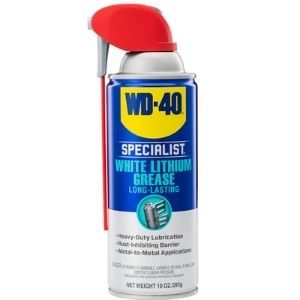
Are metal-to-metal projects what you intend to use this particular product on? Do proceed to decidedly purchase this lubricant with no reservation. This is because it is ideal for such projects.
This lubricant is manufactured from products that comprise petroleum products. Extraordinarily, it is not limited by temperature ranges. It is compatible with a range of between 00 F and 3000 F. To cement its high-quality, it is up to par with 50-state VOC standards.
Pros
- Resists melting, running off, and freezing.
- Provides a thick defensive film on surfaces.
- Offers indomitable immunity to metals.
- It is also applicable on a wide variety of surfaces, e.g., cables, pulleys, door hinges, etc.
- Exemplary for equipment meant for storage.
- Uniform spraying in a liquid state.
- Assists in protecting against corrosion and rust.
- It can be implemented for fans.
Cons
- Not recommendable for indoor use.
Buy on Amazon
4.CRC White Lithium Grease – 10 Wt Oz (5037)
Here is a deal that will impressively leave you elated with an incredible multiplicity feature on projects. Whatever applications you may encounter that require lubrication, this bargain got your back.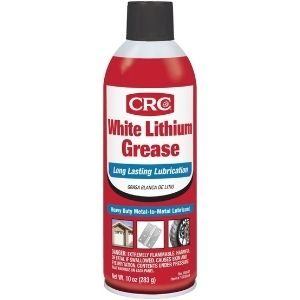
Be it lubricating guide rails, open gears, latches, slide conveyors, pistons, overhead tracks, or cams. You name it. This product will have you sorted. The lubrication it offers is phenomenal as it forms a coating that provides reliable resistance to both water and heat.
The versatility exhibited by this product is unimaginable. This is demonstrated by exceptional compatibility with a vast array of vehicles and even extends the compatibility to motorcycles and snowmobiles. The protection availed by this tool distinguishably cuts across any temperature and weather.
Pros
- Exemplary for heavy-duty metal lubrication.
- Adoptable for workshop, vehicle, and home use.
- Withstands varying temperatures and weather.
- They are intended for projects that require long-lasting lubrication.
- Ideal solution to squeaking problems.
- Suitable for an incredible array of projects.
- Released from the container with immense pressure making it perfect for tight spaces.
Cons
- Has a probability of staining some surfaces.
- The straw applicator is not integrated into its correct position but rather is attached to the side.
- It can run off to create a mess if you move the sprayed part.
Buy on Amazon
5.WD-40 Aerosol Can with Smart Straw 12Oz, 3 Pack (10032)
WD-40 brand did it again. It has presented you with a quintessential lubricant that is the ultimate solution for your metal joints problems. It is quite a simple product to use that provides an answer by freeing sticky mechanisms and getting rid of moisture.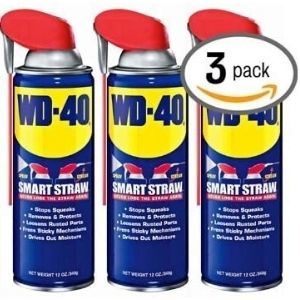
It also puts an end to the irritating squeaks from your garage door while making the rusted sections lose. You get to bag all the listed merits in one can. Incredible, right? To add to its bag, this is one of the most environmentally friendly deals you will come across as it is made in line with environmental laws and bears no chlorofluorocarbons making the lubricant cans totally recyclable.
This product utterly guarantees you of maintaining the good status of the surfaces it is applied to by failing to corrode it. Besides lubricating mobile parts, it also uniquely aids in the freeing of frozen or stuck elements.
Pros
- Manufactured considering environmental regulations.
- Rusty sections are loosened.
- Eliminates grime and grit.
- Spray straw is firmly integrated to avoid misplacing it.
- Two spraying options available; turn it up for accurate stream and downwards for habitual spraying.
Cons
- Particularly sold only as a three-pack.
Buy on Amazon
6. Blaster 16-GDL Garage Door Lubricants, 9.3 oz., Can (Pack of 12)
Perhaps one of the best lubricants you will fancy having for your garage door. Blaster 16-GDL Garage Door Lubricant is silicone-based, hence weather resistant and durable.
Besides, the presence of dust and dirt that stick on the metal surface after applying a lubricant is eliminated with Blaster 16-GDL Garage Door Lubricant, as it is characterized by a tack-free film when dry.
Also, since it contains high-pressure agents, it can be used as a grease replacement. Its ability to penetrate even in the hard-to-reach sections such as hinges makes it perfect for the garage door and precision. It works the first time; hence you will not go through the hassles of re-application.
Pros
- It can quickly go through tight spaces and hinges.
- Reduces friction and wear.
- It is resistant to dirt and dust after application when dry
- Works first-time, hence no need for re-application.
- It can be used as a grease replacement.
Cons
- You may encounter a challenge attaching the sprayer nozzle
Buy on Amazon
7. Genie Screw Drive Lube
Genie brand has stood out in the market due to the manufacture of quality and durable brand, and Genie Screw Drive Lube is no exception. The lube is perfect for reducing garage door noise and enhancing smooth operations in screw-drive garage door openers. With this unit, you do not have a problem with your garage near your bedroom.
The lube is only designed for the Genie Garage door openers and can be a disadvantage for garage owners with the other types such as Liftmaster or Chamberlain. However, for the Genie garage door opener owners, you would be impressed with the enhanced longevity of the opener rails on applying this lube. It is long-lasting. You only need to use it once a year, and your opener will operate smoothly for the rest of the year.
Unlike most lubes that are Silicone-based, Genie Screw Drive lube is has a Lithium-grease composition that facilitates ease of application. Besides, since it comes in 3-pack and you only need a single tube of the lube to lubricate the whole screw drive, you will be left with the other two packs for all your future needs, saving on future expenditures.
Pros
- It is durable. You only apply it once a year on the screws.
- Since it is Lithium-based, it is easy to apply
- Reduces the noise on the screw and enhances its smooth operation.
- It comes in 3-packs, but you only need 1-pack to lubricate the whole screw drive system. You can save the 2-packs for future needs.
Cons
- Risk freezing under extreme temperatures
Buy on Amazon
Best garage door lubricant for Cold weather Buyers’ Guide
A perfect garage door lubricant for cold weather must pass a few qualifying considerations. This section looks at these non-negotiable considerations that will help you identify the best pick when shopping for a lubricant.
Lubricating base: which is best for cold weather?
Silicone-based and lithium-based lubricants make the cut for the best lubricants for garage doors overall. However, when it comes to cold weather, these two types are supreme against the many products billed as garage door lubricants in the market today.
So, when going shopping, start by narrowing down your list to these two types of products for garage door applications.
Both silicone-based and lithium-based garage door lubricants do an excellent job; you will realize that one is better than the other in specific areas.
Nonetheless, some of the best lubricants for garage door applications are formulated with both bases in one. Such products combine the strengths of silicone and lithium into one powerful formula that works for different components.
We mention components because not all moving garage door parts are metal. For instance, seals are typically rubber, while rollers are mainly nylon or plastic.
Thankfully, these two lubricant bases are safe for all of these materials.
Here is a little breakdown to put things into perspective.
- Lithium-based lubricants. These lubricants tend to stay more on the surface than soak into the nooks and crannies of the garage door part. They are ideal for rollers, rails, and other friction points.
However, lithium-based lubricants are not waterproof, even though they are highly weather resistant.
- Silicone-based lubricants. These are the best lubricants for cold weather since they provide moisture resistance and are long-lasting.
Unlike their lithium-based cousins, these lubricants do an excellent job of working their way into coiled springs, tight hinges, and other hard-to-penetrate areas. They are incredibly resistant to both chilly and scorching weather.
Consider the intended use.
Knowing you want a lubricant for your garage door is not enough; break it down to the specific parts you wish to lubricate.
This specificity is essential because different lubricants are formulated to be more suitable for some applications than others. This is why some manufacturers include more than one product in their formulations.
That said, spray-based lubricants will be more suitable for hinges and wheels or any hard-to-penetrate areas.
The spray mechanism allows you to aim more easily, and the product soaks in more effectively.
On the other hand, tracks and rails work better with grease-based products. Grease may be messy, but it offers more durability ideal for these parts.
The lubricant base will also play a significant role here. For instance, silicone-based products do a good job of lubricating rubber seals.
On the other hand, the heavier-duty lithium and grease options are better suited for coating metal surfaces such as rails and tracks. These are not recommended for vinyl or rubber components of the garage door.
The manufacturer will often specify the surfaces that a lubricant is suitable for most of the time. So ensure you read these details before buying the product.
Which form: grease or spray?
Garage door lubricants are available in various forms, the two most common ones being grease and spray.
Grease lubricants are generally heavy and more suitable for metal surfaces. They come in tubes and cans and can be messy during application.
On the upside, grease lubricants are generally more durable than other forms. They can eliminate friction on rails and tracks for extended periods of time.
Sprays beat grease hands down in ease of application. They are typically silicone-based, with a few exceptions being lithium-based sprays.
This form of lubricant does an excellent job entering into tiny nooks and crannies in specific garage door parts.
However, they wear and run out relatively sooner than grease. So you may have to reapply a spray lubricant more frequently. The ease of use, however, makes the frequent reapplication hassle-free.
Longevity: how long does it last before reapplication?
Some products last longer than others. As already mentioned, spray lubricants generally require more frequent reapplication. Heavier forms such as grease typically last longer.
So if longevity is your sole consideration, then you may be more interested in grease than spray. Notice that you will need to consider the applicability of the product before deciding based solely on its longevity.
In any case, most manufacturers recommend reapplying their products after every few months. While it is important to follow these directives, you may also look at the practicality of such frequency.
You can always observe your garage door and tell when it is dry and in need of lubrication.
Often, factors such as your garage door’s condition, climate, and frequency or the garage door use will determine the interval of lubrication.
Think about the application method
Usually, the parts you intend to lubricate will determine the most suitable application method.
While metal surfaces like tracks and rails are easy to reach with tubes and canned lubricants, rollers and seals may not be as easy to reach. The intricacy of these garage door parts makes spraying a more suitable application method.
So, ensure you consider which part the lubricant needs to go before buying. This idea will help you choose the application method more appropriately.
Ideally, always go for a spray when lubricating parts with hard-to-reach nooks and crevices where it would be challenging to apply a thicker product.
Versatility
The primary role for these featured products is the lubrication of garage doors. However, it is recommended to look for a product that has raised the bar by allowing application to other projects.
It is expected that you will encounter other applications requiring lubricants in your day-to-day activities. For instance, when dealing with rusty windows or sliding doors, squeaking hinges, and locks, or tools bearing valves or pulleys that are gliding with difficulty, an appropriate lubricant should be not only applicable to your garage door but also resolve such issues.
Versatility is of the essence as it determines whether the product of interest will come in handy in your workshop, home, automotive, and other job sites. Versatility also makes a lubricant brag of multiplicity, allowing you to use it on a vast array of vehicles.
Smart straw
This is the component that helps you channel the spray to the desired area. The lubricant is stored under pressure in the container, and therefore a tool devoid of this smart straw component would leave a mess on the sprayed area and allowing a lot of wastage of the lubricant.
It is of the essence to examine for the inclusion of the straw. Some products have the straw attached on the side of the can, while others are availed with the straw already assembled on the container. The latter, on the upside, are ready to use and eliminate possibilities of misplacing the straw hence more preferred.
Another aspect for examining this feature is checking whether the straw is adjustable. Some deals offer products with two spraying options. You can either opt to flip it up for accurate (pinpoint) spraying or flip it downwards for the normal spray stream. The smart straw also helps you focus the spray stream in tight spaces. For these reasons, a product with a smart straw is highly recommended.
Lubricant type
As discussed earlier, there are silicone grease lubricants and lithium grease lubricants. Both are excellent depending on the application and context they are being used in. However, silicone lubricants boast of imparting safe lubrication on both metal and non-metal surfaces like vinyl, rubber, and plastic.
These silicone lubricants are water-resistant and form a non-staining coating that leaves no residues and is free from sticking. Lithium lubricants, especially white lithium grease, on the other hand, are quite efficient. They provide marked protection by forming a thick grease coating that exceptionally lasts long on the application area.
Knowing the difference in lubricant type will help you determine that which is most suitable for your projects. For instance, between the two types, silicone grease lubricants withstand a larger temperature range than lithium lubricants; thus would be the perfect pick if your projects are based in a cold environment.
Below are the detailed information on the various types of lubricants
Lithium-based Lubricants
Naturally, Lithium is considered a form of thickener that provides a structure to hold oil in place and acts as a sponge by releasing small amounts of oil while in use. However, since it is a heavy-duty type of lubricant, you can use it for metal-to-metal applications to help reduce friction between metal parts. It comes in aerosol form.
Some of the drawbacks you will experience with Lithium-based lubricants are that even though it is weather-resistant, it does not prevent the penetration of water (not waterproof) and does not easily penetrate tight places.
Silicone-based Lubricants
Among the lubricant types, silicon-based are the best lubricants for cold weather as they are moisture-resistant and durable. Besides, silicone-based lubricants provide all the solutions to the demerits of Lithium-based types. You are assured of reaching even the tightest places such as the garage door hinges.
Besides, since they are weather-resistant, they are suitable, both, for hot summers and cold weather in the winter.
Spray Lubricants
For efficiency and specificity, choose to use spray lubricants. The type of spray can either be lithium or silicone-based. Due to their integration with straws, you can focus on a specific area that you intend to lubricate, enhancing accuracy.
Unlike grease applications, spray lubricants quickly soak in tight places and are easy to apply. The only drawback you will experience with the spray lubricants is that they wear off quickly; hence, you will need frequent lubrication.
Oil-based Lubricants
If your garage is located in an area that experiences cold weather or during the winter seasons, you will not fancy oil-based lubricants. The type is not weather-resistant and less durable, hence not ideal for cold weather. Besides, they are less sticky and can easily get flung from the rotating parts.
Grease Lubricants
The grease lubricants come in tubes and cans. Unlike oil-based lubricants, grease is durable and massively reduces friction between moving parts. Its application is also simple as it only involves smearing it onto the parts you intend to lube.
They also consist of both silicone and lithium types, and you can effectively use them in cold temperatures as they are weather resistant.
Can characteristics
The containers in which the lubricant is packaged in can also weigh in as a factor to consider. Characteristics like can size, environmental friendliness, and product availability for usage are quite key.
Delving into can size, a larger container, or a deal providing several bottle packs would be preferred as you get to have adequate lubricant at your disposal while saving your time and money in the long haul.
A deal providing a size of between 10 and 12 oz is recommended and will be sufficient for you. Under the environmental friendliness scope, some brands, for instance, have gone an extra mile and customized the bottles to be 100% recyclable. It will also be a beneficial move for you if you settle for a ready-to-use product upon delivery.
Other factors
Other characteristics generally make a product possessing some or all of the traits an ideal lubricant. They include;
- Fast-drying formula – this trait makes a lubricant to dry out quickly upon application leaving no room for amassing of dirt and grime.
- Failure to melt, freeze, or run off – After application, several environmental factors may negatively impact the lubricant, therefore minimizing its efficacy. Therefore, you ought to opt for a bargain that can withstand such factors by failing to melt, freeze, or running off. This property also ensures that no mess is left behind.
- Failure to foam after application.
- Anti-corrosion properties – this trait makes a lubricant secure for use by ensuring that no damage to the surface through corrosion is impacted. However, you ought to check the suitability of a particular product to multiple surfaces before purchasing.
- Offer protection from rust and sets free bonds of rust and metal.
- Loosens stuck or frozen elements.
How to prevent your garage door from freezing- 5 ways
A frozen garage door can be a risk to you and your loved ones and can be coupled with several other inconveniences, such as the garage door failing to open or close.
You can evade such inefficiencies and misfortunes when you learn how to winterize your garage door.
Below are some of the approaches you can take to prevent your garage door from freezing in the winter or cold weather.
Sprinkle Salt Underneath the Door
During the cold seasons, coupled with snow, table salt can come to your rescue by preventing water from freezing around your garage door. You can, however, not apply salt directly to your garage door, especially the metallic parts, as salty media accelerates rusting.
Apply the salts on the floor on the outside and inside around the garage door. The salt will melt the snow faster and prevent it from refreezing, allowing your garage door to open and close at your convenience.
Use a Silicone-Based Lubricant
The type of lubricant you choose for your garage door should have low freezing temperatures. For instance, the grease lubricants freeze when the temperatures are too low, which can prevent your door from opening since the wheel can freeze to the rails of the garage.
However, the silicone-based lubricants exhibit the lowest freezing temperatures and are perfect for your garage door in the cold season. When applied, you do not have to worry about your garage door freezing over, hence an effective way to winterize your garage door.
Install garage Heater
Installing a garage heater is another critical approach you can take if you want to deal with snow that forms around your garage door. In cold winter and especially when it is about to snow, turn on the heater to help melt the ice off the garage door before beginning the daily operations.
That will ensure sufficient heat and desirable temperature in the room that will prevent your garage door from freezing.
Install Insulation
Insulating your garage door is a practical approach to keeping your garage warm in the winter and preventing the doors from freezing. Insulation helps keep the warm air in, not supporting the temperatures needed to form snow.
Check the Seal
Always check on the weather seal to determine when they need replacements. The water or snow that can possible find their way in your garage are prevented through weather-stripping along the bottom of your garage.
The weather-stripping can begin coming apart as it pushes up against the ground with time. This can pose your garage door to the danger of freezing during the cold weather from snow or water. Always check onto the seal after a given period, say, 3 or 5 years, to replace the weather-stripping as an approach to winterize your garage.
Frequently Asked Questions-FAQs
How do I lubricate my garage door in cold weather?
A direct answer would be to lubricate all the moving parts. However, you need a concise consideration when choosing the type of lubricant to use that is weather resistant as it is specific to cold weather.
To lubricate the moving parts of your garage door, first, clean the tracks. Then lubricate the rollers, hinges, and tracks using a regular grade machine oil. Do not use heavy axle grease that can enhance the sticking of the parts in cold weather.
The lubrication helps reduce friction between the moving parts that can stall and stick when it is cold, improving the efficiency of our garage door.
What lubricant does not freeze?
If you are looking for a lubricant that would not freeze and is perfect for cold weather, look no further than a 3M silicone Lubricant. It effectively eliminates rubber squeaks, seals out moisture, and prevents sticking of the moving parts.
Besides, since 3M Silicone has no petroleum oils, you can be assured your fabrics will not get stained. It is made for extreme temperature conditions, hence cannot degrade at 350°F or even freeze at -28°F. It is a top-level lubricant for severe weather conditions.
Does garage door lubricant freeze?
No. Most garage door lubricants are weather-resistant with waterproof properties that reduce the water’s freezing point. When you aim at the right spots in your garage door when spraying, the lubricants will prevent freezing and enhance the efficiency of your garage door.
Why is my garage door freezing?
A garage door freezing would be a primary concern for a garage owner. You would want to establish the main culprits to this occurrence. One possible area you should run to is your weather seals. When dry or worn out, weather seals can freeze your garage door.
If you find them tattered or falling off, it would be wise to replace them. As a remedy, use silicone-based oil lubricants to keep the moving parts of the garage free from freezing and sticking for smooth gliding.
Are Garage Door Lubricants harmful to the skin?
Even though most lubricants would not harm you, you should have protective wearing such as gloves when handling them since they are made from various chemicals that can be harmful to your skin. So as a precaution, wear gloves when applying the lubricants.
Shovel Snow the garage door
Removing the snow using the best cordless/corded snow shovels is another vital practice to preventing snow from melting or refreshing and causing your garage door to freeze.
Even though this is not one of the most straightforward steps you would wish to execute as you strive to winterize your garage door, shoveling near the garage doors can protect them from freezing.
There are certain winter seasons when it snows almost all day, and shoveling snow becomes necessary when you want to keep your garage free of snow, hence another reasonable practice to winterize your garage.
Conclusion
Various garage door lubricants are formulated to work better within certain temperature ranges. Knowing which options are best for cold weather is an excellent way to narrow down your search and improve your shopping experience.
More importantly, getting the right lubricant for your garage door can help your garage door operate better and last longer.
We hope this review and buyer’s guide was helpful. Please leave a comment in the comments section if you have any observations or additions.